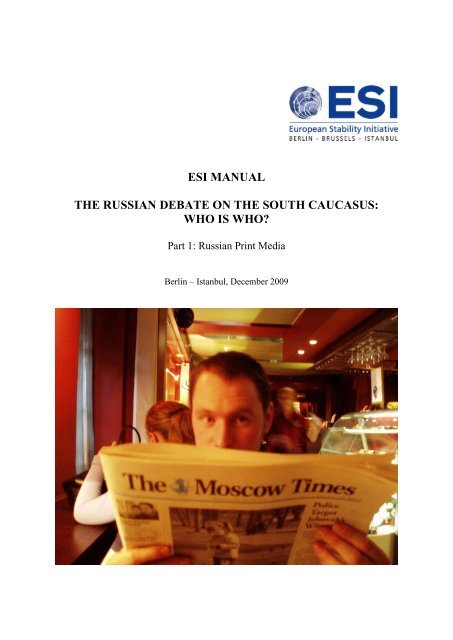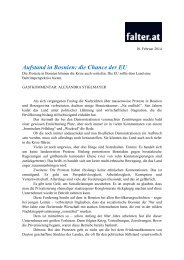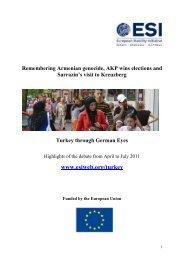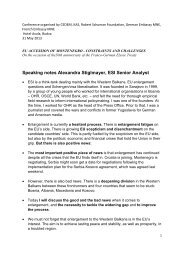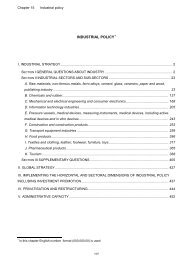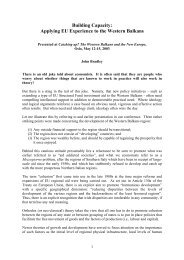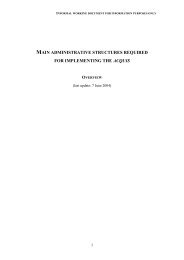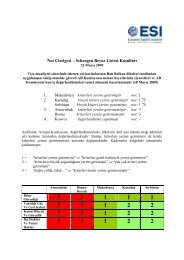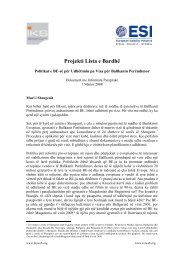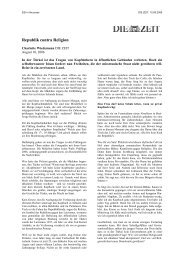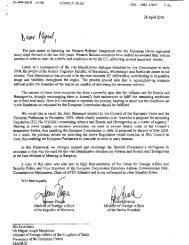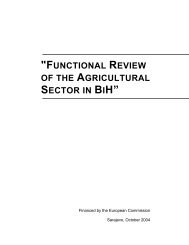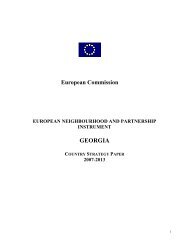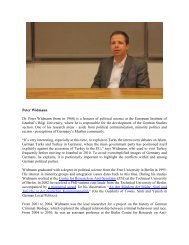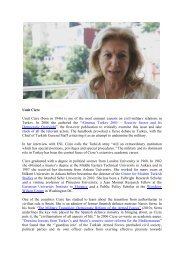WORKING DRAFT - ESI
WORKING DRAFT - ESI
WORKING DRAFT - ESI
Create successful ePaper yourself
Turn your PDF publications into a flip-book with our unique Google optimized e-Paper software.
<strong>ESI</strong> MANUAL<br />
THE RUSSIAN DEBATE ON THE SOUTH CAUCASUS:<br />
WHO IS WHO?<br />
Part 1: Russian Print Media<br />
Berlin – Istanbul, December 2009
2 Russia’s Foreign Policy and the Caucasus<br />
~ Contents ~<br />
NEWSPAPERS ..................................................................................................................................................... 3<br />
DAILIES .............................................................................................................................................................. 4<br />
WEEKLIES ......................................................................................................................................................... 12<br />
NEWS AGENCIES............................................................................................................................................. 14<br />
WEB-MEDIA ...................................................................................................................................................... 17<br />
ENGLISH LANGUAGE MEDIA ..................................................................................................................... 26
Russia’s Foreign Policy and the Caucasus 3<br />
NEWSPAPERS<br />
Most widely read Russian newspapers by circulation and Average Issue Readership (AIR).<br />
Paper Owner Circulation Average Issue<br />
Readership (AIR)<br />
DAILY NEWSPAPERS<br />
Moskovsky Komsomolets Pavel Gusev 2.040,000 ----<br />
Komsomolskaya Pravda YeSN 640,900 2.171,500<br />
Rossiyskaya Gazeta Russian government 218,905 1.160,900<br />
Izvestiya SOGAZ 177,000 420,200<br />
Novaya Gazeta* Staff (majority shareholder) 171,000 ---<br />
Kommersant<br />
Vedomosti<br />
Nezavisimaya Gazeta**<br />
WEEKLY NEWSPAPERS<br />
Alisher Usmanov<br />
Independent Media<br />
Konstanin Remchukov<br />
125,000 –<br />
135,000<br />
73,000***<br />
56,940<br />
371,600<br />
195,000<br />
70,100<br />
Argumenty i fakty Promsvyazbank 2.750,000 7.934,000<br />
Expert 90,740 ---<br />
Kommersant-vlast‟ 60,000 ---<br />
Russian Journal 2,000 ---<br />
ENGLISH MEDIA<br />
The Moscow News RIA Novosti 45,000 79,500 1<br />
The Moscow Times 35,000 41,400<br />
Sources: prosmi.ru for circulation, tns-global.ru from September 2008 – February 2009 for<br />
Average Issue Readership, circulation for Russia<br />
* Source for Circulation of Novaya Gazeta: National Circulation Service, Russia, 2007<br />
** Nezavisimaya Gazeta (March – July 2007, only Moscow)<br />
*** TNS Gallup Media 2008<br />
Other Source: http://www.mediaguide.ru/?p=list&screen=1&page=9&sort=1<br />
With circulation and rank<br />
Source for weekly newspapers www.prosmi.ru<br />
1 RIA Novosti, „The Moscow News erneuert ihr Design und wirft einen neuen Blick auf Moskau,“ 23 April<br />
2009. http://de.rian.ru/society/20090423/121274058.html
4 Russia’s Foreign Policy and the Caucasus<br />
Dailies<br />
Novaya Gazeta<br />
Новая Газета<br />
www.novayagazeta.ru<br />
Novaya Gazeta was founded in 1993 by journalists who previously worked with Komsomolskaya<br />
Pravda. The paper is known for its in-depth investigations on sensitive issues such as high-level<br />
corruption, human rights violations, and abuse of power. In 2006 the former President Mikhail<br />
Gorbachev and the businessman Alexander Lebedev bought 49% of the newspaper. Novaya Gazeta<br />
has a staff of 60 journalists and is one of the few newspapers to report in detail on the liberal<br />
opposition. It has paid a heavy price for its critical stance, however. Three of Novaya Gazeta‟s<br />
reporters have been killed. One of them was the investigative journalist Anna Politkovskaya, who<br />
gained international recognition for her independent coverage of Chechnya and the North Caucasus.<br />
In October 2006 Politkovskaya was shot dead outside her Moscow home.<br />
Novaya Gazeta comes out three times a week (on Mondays, Wednesdays and Fridays) with some<br />
English-language pages. Every Friday Novaya Gazeta publishes a supplement on political and social<br />
issues.<br />
Dmitri Muratov is founder and Editor-in-chief of Novaya Gazeta.<br />
E-mail: 2009@novayagazeta.ru<br />
Andrey Lipsky is deputy chief editor and responsible for news and the press.<br />
E-mail: 2009@novayagazeta.ru<br />
Vitali Semyonovich Yaroshevky is Deputy Chief Editor and head of the foreign desk.<br />
E-mail: 2009@novayagazeta.ru<br />
Nadyezhda Prusenkova is press officer of Novaya Gazeta<br />
E-mail: pr@novayagazeta.ru<br />
Southern Caucasus Coverage
Russia’s Foreign Policy and the Caucasus 5<br />
Yelena Milashina works for the special reports department.<br />
E-mail: 2009@novayagazeta.ru<br />
Her articles on Georgia: http://www.novayagazeta.ru/data/?auth=391&sb_a=1 (in<br />
Russian only). Milashina interviewed Kakha Bendukidze on 19 November 2007:<br />
http://www.novayagazeta.ru/data/2007/88/21.html (in Russian only). She also filed a<br />
report entitled “Grisha and Zema” on Tskhinvali one month after the war:<br />
http://www.novayagazeta.ru/data/2008/68/17.html (in Russian only). At the beginning of December<br />
2008 she wrote about peace and humanitarian aid in South Ossetia:<br />
http://www.novayagazeta.ru/data/2008/89/22.html (in Russian only).<br />
Natalya Rostova wrote on mass media in the Russian-Georgian war in August 2008.<br />
E-mail: 2009@novayagazeta.ru<br />
Her articles: http://www.novayagazeta.ru/data/?auth=114&sb_a=1 (in Russian only)<br />
Alexander Mineyev is correspondent in Brussels and covers NATO and Georgia<br />
His articles: http://www.novayagazeta.ru/data/?auth=99&sb_a=1 (in Russian only)<br />
Nezavisimaya Gazeta<br />
Независимая газета<br />
www.ng.ru<br />
Nezavisimaya Gazeta is an influential privately-owned daily. The paper was founded in December<br />
1990 and was owned by Boris Beresowsky‟s Media Group until 2005. Nezavisimaya Gazeta occupies<br />
a prominent position among the upmarket Russian press, targeting educated and politically active<br />
Russians. It is regarded as a prestigious platform for politicians, businessmen and academics. It also<br />
publishes eight supplements each week on topics such as science, regional news, economy and<br />
diplomacy. In August 2005 Konstantin Remchukov, at the time a Russian government adviser,<br />
acquired the paper.<br />
Konstantin Remchukov appointed himself Editor-in-chief in February 2007.<br />
E-mail: info@ng.ru
6 Russia’s Foreign Policy and the Caucasus<br />
Responsible for the political coverage is Alexandra Samarina.<br />
Svetlana Gamova is head of the „politics of the near abroad‟ desk.<br />
Correspondents in the Southern Caucasus<br />
Georgia: Yury Simonyan is correspondent in Tbilisi. He also publishes articles on the website of the<br />
weekly journal Expert and writes for Moskowsky Komsomolets<br />
His articles in Russian:<br />
http://www.ng.ru/search/?stream_id=documents&query=%D1%E8%EC%EE%ED%FF%ED<br />
Eteri Kakabadze (Какабадзе Этери) is also correspondent for Nezavisimaya Gazeta, Sh. Rustaveli<br />
Prosp. 42, 380008, Tbilisi, Phone: : +995 32 92 32 12, +995 32 94 25 49<br />
Vedomosti<br />
Ведомости<br />
www.vedomosti.ru<br />
Vedomosti is one of Russia‟s leading business broadsheets. Although the circulation is comparatively<br />
small, the paper is considered one of the most objective and reliable sources of information in Russia.<br />
It was founded in 1999. Published in conjunction with the Wall Street Journal and the Financial<br />
Times, it intersperses articles by Russian journalists with translated material from both publications. It<br />
includes sections such as “Politics and Society” and “Companies and Markets”. Vedomosti is owned<br />
by the Independent Media Sanoma Magazines publishing house, which belongs to Finland‟s Sanoma<br />
Media Group. Sanoma also owns Moscow based English language newspaper The Moscow Times.<br />
Editor-in-chief is Yelisaveta Osetinskaya.<br />
Phone: +7 495 956–34–58<br />
E-mail: osetinskaya@vedomosti.ru.<br />
Head of the political desk is Maksim Glikin.<br />
E-mail: m.glikin@vedomosti.ru<br />
The head of the influential comment page department is Maksim Trudolyubov. Email:<br />
trud@vedomosti.ru
Russia’s Foreign Policy and the Caucasus 7<br />
Editor of international news is Michail Overtshenko.<br />
E-mail: overchenko@vedomosti.ru.<br />
Moskovsky Komsomolets<br />
Московский Комсомолец<br />
www.mk.ru<br />
The popular Moskovsky Komsomolets, founded by journalists, is a nationwide daily newspaper<br />
covering social-political issues for a mass audience. It first came off the press on 11 December 1919<br />
and is one of the oldest newspapers in Russia. Moskovsky Komsomolets is now circulated in all 89<br />
subjects (administrative regions) of the Russian Federation. Much of the paper‟s reporting focuses on<br />
issues of interest to people living in the capital, who form its core readership. The paper also publishes<br />
a series of regional editions and supplements tailor-made for audiences in the former Soviet republics.<br />
It is well known for exposing corruption among senior officials, and expresses broad support for the<br />
policies of Moscow‟s long-serving mayor, Yuri Lushkov.<br />
Pavel Gusev is Editor-in-Chief. He has held the job since 1983, an unusually long<br />
stint in Russia‟s volatile media market. He is believed to own much of the<br />
newspaper‟s stock.<br />
Phone: +7 95 259 50 36<br />
Yelena Korotkova is head of the CIS countries‟ and regional policy department with a<br />
staff of 12 correspondents in countries such as Ukraine, Latvia, Armenia or Georgia.<br />
Correspondents in the Southern Caucasus<br />
Georgia<br />
Yury Simonyan is correspondent in Tbilisi. He also works for Nezavisimaya Gazeta and writes for<br />
Expert Journal.<br />
Armenia
8 Russia’s Foreign Policy and the Caucasus<br />
Pyotr Maghdashyan is correspondent in Yerevan. He also works for Radio Russia.<br />
Phone/Fax: +374 10 53 79 55<br />
E-mail: pmaghdashyan@hotmail.com<br />
Daily newspapers owned by the state or by institutions with close links to the Russian government.<br />
Izvestia<br />
Известия<br />
www.izvestia.ru<br />
Izvestia, founded in 1917, is one of the oldest newspapers in Russia. It was popular, highly respected<br />
and continued to enjoy wide readership in the 1990s, primarily among intellectuals and academics. In<br />
June 2005, the media arm of the state-controlled energy giant Gazprom bought a majority stake.<br />
Although some observers thereafter criticised the paper for adopting a clear pro-Kremlin line, the new<br />
owners cited commercial considerations as a reason for changes in the paper‟s coverage. In May 2008<br />
Gazprom sold its stake in Izvestia to the SOGAZ insurance company. SOGAZ is part of a group<br />
controlled by the St. Petersburg-based Bank Rossiya whose co-owner, Yuriy Kovalchuk, is widely<br />
reported to be a close associate of Prime Minister Vladimir Putin.<br />
Vitali Abramow has been Editor-in-Chief since October 2009. He had previously<br />
been Deputy General Director for regional development of state-owned<br />
Rossiyskaya Gazeta.<br />
E-mail: info1@izvestia.ru<br />
Correspondents in the Southern Caucasus<br />
Georgia<br />
Kirill Kolodin is correspondent in Tbilisi.<br />
His articles on Georgia: http://www.izvestia.ru/georgia1/ (in Russian only)
Russia’s Foreign Policy and the Caucasus 9<br />
Kommersant<br />
КоммерсантЪ<br />
www.kommersant.ru<br />
The liberal Kommersant newspaper is one of Russia‟s leading business broadsheets and the flagship<br />
of Kommersant publishing house. Founded in 1989, the paper was originally a weekly publication,<br />
but expanded in 1992, styling itself as Russia‟s first business daily. Once owned by the exiled<br />
oligarch Boris Berezovsky, the paper was bought in August 2006 by Alisher Usmanov, a steel tycoon<br />
who also runs a subsidiary of Gazprom and owns a major stake in the English football club Arsenal.<br />
Despite its purchase by the Kremlin-friendly Usmanov, Kommersant retains its reputation in Russia<br />
as “independent”. It has 15 regional offices from St. Petersburg in the north to Chabarovsk in the Far<br />
East.<br />
Andrei Vasilyev is head of the editorial departments at the Kommersant daily, the<br />
political weekly Kommersant vlast, the economics weekly Kommersant dengi, as well<br />
as other publications belonging to Kommersant Publishing House.<br />
E-mail: vasilyev@kommersant.ru<br />
Azer Mursaliyev is Editor-in-chief of Kommersant daily. He has two deputies – Ilya<br />
Bulavinov and Alexander Stukalin.<br />
E-mail: mursliyev@kommersant.ru<br />
The foreign department has a staff of 8, headed by Leonid Gankin.<br />
E-mail: gankin@kommersant.ru<br />
Southern Caucasus Coverage<br />
Alexander Gabuyev is a commentator, focusing on Georgia, gas and Turkey-Russian<br />
relations. E-mail: gabuyev@kommersant.ru<br />
His articles: http://www.kommersant.ru/authors/author.aspx?id=41 (in Russian only)
10 Russia’s Foreign Policy and the Caucasus<br />
Olga Allenova is a special correspondent and covered the Russian-Georgian war and<br />
South Ossetia. E-mail: kommersant@kommersant.ru,<br />
Together with Georgy Dvali, editor at the news desk, Allenova reported from Tbilisi:<br />
http://www.kommersant.ru/doc.aspx?DocsID=1154791<br />
Other articles: http://www.kommersant.ru/doc.aspx?DocsID=1144650 (in Russian<br />
only)<br />
E-mail: allenova@kommersant.ru<br />
Komsomoskaya Pravda<br />
Комсомольская Правда<br />
www.kp.ru<br />
Komsomolskaya Pravda, established in 1925, reached the height of its popularity in 1990 when its<br />
peak daily circulation of almost 22 million secured an entry in the Guinness Book of Records. Since<br />
then, it has built its reputation on a gentle nostalgia for the Soviet period, firm backing for Kremlin<br />
policy and a keen interest in celebrity news and scandal from home and abroad. The paper is currently<br />
owned by the Russian energy ECN Group. It is led by Grigory Berezkin who has close links to<br />
Russia‟s gas giant Gazprom.<br />
Editor-in-chief and General Director of the Komsomolskaya Pravda is Vladimir<br />
Sungorkin.<br />
E-mail: kp@kp.ru<br />
Alexei Ganelin is Chief Editor (in Russian: Chef Redaktor) and, as such, the second<br />
most influential editor. He acts as connection between the Editor-in-Chief and the<br />
editorial staff. Phone: +7 495 777 02 84 E-Mail: kp@kp.ru<br />
Yelena Tshinkova writes regularly on Georgia.<br />
Correspondents in the Southern Caucasus:<br />
Georgia<br />
Irina Baramidze Phone: +995 32 38 24 04 / Phone: +995 32 934 822, Fax: +995 32 933 873<br />
Rossiyskaya Gazeta<br />
Российская Газета<br />
www.rg.ru<br />
Rossiyskaya Gazeta was set up by the Russian government in 1990, before the collapse of the Soviet<br />
Union. It remained fully government-owned thereafter. The paper is authorised to publish all new<br />
laws in full, heralding their entry into force, decrees of the president and resolutions of the<br />
government. Despite its affiliation, Rossiyskaya Gazeta has been known to voice criticism of<br />
ministerial policy. The paper‟s managing director has dismissed the widely-held view that it is a
Russia’s Foreign Policy and the Caucasus 11<br />
government mouthpiece, describing it instead as an “independent media outlet”. By its own account<br />
Rossiyskaya Gazeta‟s audience are “well-balanced adults with conservative views”.<br />
Editor-in-chief is Vladislav Fronin. He has two Deputies – Yuri Lepsky and<br />
Natalya Tatarinova.<br />
E-mail: office@rg.ru<br />
E-mail: politika@rg.ru<br />
Rossiyskaya Gazeta has correspondents in Ukraine and Belarus and Georgia. The coverage of the<br />
southern region of Russia and partly of the Russian-Georgian war was run out of the regional office in<br />
the southern city of Stavropol.<br />
The Stavropol regional correspondent is Svetlana Emelyanova. E-mail: stav@rg.ru<br />
She covers the Kabardino-Balkarskaya Republic, Northern Ossetia, the Stavropolsky region and the<br />
Chechen Republic.
12 Russia’s Foreign Policy and the Caucasus<br />
Weeklies<br />
Argumenty i Fakty<br />
Аргументы и Факты<br />
www.aif.ru<br />
With almost 3 million copies, the popular weekly Argumenty i Fakty has the highest circulation of<br />
any Russian newspaper. Founded in 1978, it quickly gathered a strong following, reaching a reported<br />
circulation of more than 33 million in 1990. After 1985, during Glasnost, Argumenty i Fakty was one<br />
of the leading publications. Although its readership is now considerably smaller, the paper‟s mix of<br />
political analysis and speculation, patriotic sentiment, high-profile interviews, regional supplements<br />
and consumer advice has ensured its prominence on Russia‟s news stands. One of Russia‟s largest<br />
banks, Promsvyazbank, has a controlling interest in the paper. On its website AiF describes its<br />
readership amongst others as “working people, intellectuals and politicians”.<br />
Editor-in-chief is Nikolai Zyatkov.<br />
E-mail: moskva@aif.ru<br />
Correspondents in the Southern Caucasus<br />
The aif-weekly has three offices in the Southern Caucasus.<br />
Georgia<br />
AiF Tbilisi<br />
Phone: +995 32 93 38 73, Fax: +995 32 93 48 22<br />
Armenia<br />
AiF Yerevan<br />
Phone: +374 10 53 90 14, Fax: +374 10 53 90 11<br />
Е-mail: argumenti@mail.ru<br />
Azerbaijan<br />
AiF Baku<br />
Phone: +994 12 97 12 13, Е-mail: vham@mail.ru
Russia’s Foreign Policy and the Caucasus 13<br />
Expert<br />
Эксперт<br />
www.expert.ru<br />
Expert, founded by a group of editors and journalists who departed from Kommersant publishing<br />
house, is Russia‟s leading business weekly magazine on political and business issues. It is currently<br />
part of Expert Group, a publishing, conference and research company based in Moscow. Since 2002<br />
the magazine nominates its Person of the Year – one or several individuals who significantly<br />
influence economic, business, political or social development in Russia. In 2003, two of the nominees<br />
were Roman Abramovich and Mikhail Khodorkovsky, key shareholders of the Sibneft and Yukos oil<br />
companies, respectively. They were hailed for adopting corporate governance policies that helped run<br />
their companies efficiently and profitably. The magazine is distributed in Russia and the CIS<br />
countries. The website is also in English.<br />
Editor-in-Chief is Valery Fadeev. He is also Director of the Institute of Public<br />
Engineering, Chairman of the business journalism guild “MediaSoyuz”, as well<br />
as a member of the Russian Social Council for the Development of Education,<br />
the General Council of the All-Russian public organization “Business Russia”,<br />
and the Social Council for National Reward. Fadeev is Professor at Moscow<br />
State University‟s Higher School of Economics.<br />
Correspondents in the Southern Caucasus<br />
Georgia: Gevorg Mirzayan<br />
Russian Journal<br />
Русский Журнал<br />
www.russ.ru<br />
Russian Journal is a primarily Russian-language website. It was the first political tribune on the<br />
Internet. The daily online publication is devoted to cultural, political and social issues. The original<br />
Russian Journal was founded in July 1997. The English version was launched in December 2001.<br />
Gleb Pavlovsky, an influential Kremlin-adviser and self-described “political<br />
technologist”, is the Editor-in-chief. He is the founder of the Foundation for<br />
Effective Politics, which he presides (see also think tank section). He actively<br />
participated in parliamentary and presidential election campaigns. Pavlovsky is also<br />
the founder of a number of influential Russian media networks such as Gazeta.ru,<br />
Strana.ru, SMI.ru, Kreml.org, Liberty.ru and others. He is Professor at Moscow<br />
State University‟s Higher School of Economics.<br />
Boris Mezhuev is Deputy Chief Editor. He is a former Editor-in-Chief of the<br />
Political News Agency website and former Deputy to the Editor-in-Chief of Smysl<br />
magazine. Mezhuev has appeared in different magazines and newspapers such as<br />
Polis, Pro et Contra and Political Magazine. After the Russian-Georgian war in<br />
August 2008 he argued against recognizing South Ossetia and Abkhazia as<br />
independent states. (Russian Journal, 12 August 2008, http://russ.ru/Mirovayapovestka/Vernite-Shevardnadze!)
14 Russia’s Foreign Policy and the Caucasus<br />
NEWS AGENCIES<br />
Interfax<br />
Интерфакс<br />
www.interfax.com<br />
Interfax is the major Russian news agency and the only fully private-owned one.<br />
Alexei Meshkov is Editor-in-Chief of General Information Services.<br />
Correspondents in the South Caucasus<br />
Georgia: Vakhtang Lomtadze: Phone: +995 32 96-47-26 Fax: +995 32 95-08-25<br />
Armenia: Arman Tarjmanyan: Phone/Fax: +374 10 24 24 91; E-mail: tagarm@rambler.ru<br />
ITAR-TASS<br />
ИТАР-ТАСС<br />
www.itar-tass.com<br />
Itar Tass, the state-owned successor to the Soviet news agency TASS, is one of the largest Russian<br />
information agencies. It has pages in English.<br />
Vitaly Ignatenko is General Director.<br />
Pavel Mikhalev is Deputy Director General and Director of Foreign News<br />
Phone: +7 095 2297925<br />
E-mail: itar@itar-tass.com<br />
Correspondents in the Southern Caucasus:<br />
Georgia: Tengiz Patchkoriya: Phone/Fax: +995 32 98-95-47<br />
Armenia: Tigran Liloyan: Phone/Fax: 374 10 52 02 42; E-mail: tass@arminco.com<br />
RIA – Novosti<br />
Риа Новости<br />
www.rian.ru<br />
Ria Novosti, also state-owned, is one of the leading Russian news agencies. Besides Russian, it has<br />
pages in English, German, French, Arabic and Chinese.<br />
Svetlana Mironyuk is Editor-in-Chief.
Russia’s Foreign Policy and the Caucasus 15<br />
Denis Perepelizyn is Deputy Chief Editor:<br />
E-Mail: perepel@rian.ru<br />
Correspondents in the Southern Caucasus<br />
Georgia<br />
Maria Kvaratscheliya: (office Director) Phone: +995 32 93-51-20; Fax: +995 32 93 17 49<br />
Armenia<br />
Gamlet Matevosyan: Phone: +374 10 54 14 11; E-mail: adem@arminco.com<br />
Regnum.ru<br />
www.regnum.ru<br />
Regnum.ru is a federal news agency which started working on 23 February 1999 when it merged with<br />
a group of web-based information agencies including Baltika, KNews, MurmanNews and MariNews.<br />
Regnum established its own network of correspondents and made the platform available to local<br />
politicians as well as non-governmental organisations. A selection of articles is translated in English.<br />
Editor-in-Chief is Modest Kolerov. He is also Chairman of the Union of the<br />
Svobodnaya Rossiya public association and co-founder of Regnum. Kolerov is<br />
Professor at the Department of Information Policy of Moscow State University‟s<br />
Higher School of Economics and Valid State Counselor, Class I. He is a former<br />
head of the Russian President‟s Department for Interregional and Cultural Ties with<br />
Foreign Countries (2005-2007) and holds a PhD in Historical Sciences.<br />
Correspondents in the Southern Caucasus:<br />
Transcaucasian Editorial Bureau in Armenia<br />
Chief Editors: Vigen Hakobian, Armenika Kivirian: Phone/Fax: +374 10 53 72 47; E-mail:<br />
regnum@netsys.am; Web Site: http://www.regnum.ru<br />
Information Agency ROSBALT<br />
Информационное агентство РОСБАЛТ<br />
www.rosbalt.ru<br />
www.rosbaltsouth.ru (Rosbalt-Kavkaz)<br />
Rosbalt is an information agency with headquarters in St. Petersburg and regional offices in Moscow,<br />
Nizhni Novgorod, and Rostov-on-Don (covering the Caucasus region), as well as in Ukraine and<br />
Latvia. The Rosbalt-Kavkaz division provides extensive coverage of the entire Caucasus region.
16 Russia’s Foreign Policy and the Caucasus<br />
Headquarters in St. Petersburg:<br />
IA Rosbalt<br />
Ul. Rubinshteina, 30 A (main office), 191002 St. Petersburg, Russia<br />
Fax: +7 (812) 320 50 43<br />
Rosbalt-Kavkaz, Regional office in Rostov-on-Don:<br />
Address: ul. Sotsialisticheskaya, d. 74 (ofisnyy tsentr Kupecheskii Dvor), office 404, 344022 Rostovna-Donu.<br />
Tel. +7 (863) 268 94 83<br />
Maria Kustova is the website editor. Tel. +7 (812) 320 50 43<br />
Dmitry Remizov is Press Center Director. Tel. +7(863) 250 66 90<br />
Correspondent Samvel Martirosyan<br />
City/Region Yerevan<br />
Tel./Fax +374 10 43 58 14<br />
E-mail sammart@arminco.com
Russia’s Foreign Policy and the Caucasus 17<br />
WEB-MEDIA<br />
Newsru.com<br />
Newsru.com, formerly the website of the Channel NTV, is one of the largest and most viewed news<br />
portals in Russia. From mid-October to mid-November 2009, according to the Rambler Top 100<br />
index, the Newsru.com website had over 183,000 unique visitors per day. 2<br />
Editor-in-Chief is Yelena Bereznitskaya-Bruni<br />
Newsru.com also runs Inopressa.ru, a website providing Russian translations of selected articles<br />
published by foreign (primarily Western) mass media.<br />
Tel. + 7 (495) 755 77 67<br />
E-mail: editors@inopressa.ru<br />
Lenta.ru<br />
www.lenta.ru<br />
Lenta.ru is a web-based daily newspaper founded as a result of cooperation between the Foundation<br />
for Effective Policies, the Rambler Internet holding, and a team of internet professionals who created<br />
the Gazeta.Ru project. Lenta.Ru is among the top 5 most widely read online news outlets, boasting<br />
nearly 220,000 unique visitors per day. 3<br />
Editor-in-Chief: Anton Nossik<br />
Executive Secretary: Yulia Minder<br />
Pravda.ru<br />
www.pravda.ru<br />
Pravda.Ru (known as Pravda On-line until 2003) is one of the first and most popular online<br />
resources in Russia. Launched in January 1999, Pravda On-line was established by a group of<br />
journalists who had previously worked for the famous Soviet Pravda. Pravda.Ru is also published in<br />
English, Italian and Portuguese, with the English version being one of the leading Russian<br />
information sources used by foreign readers.<br />
According to the Rambler Top 100, from mid-October to mid-November Pravda.Ru was the 14 th most<br />
visited website in Russia in the news media category, attracting an audience of over 62,000 unique<br />
visitors daily. 4<br />
Editor in Chief is Andrey Chereshnev<br />
2 http://top100.rambler.ru/top100/Media/rate25.0.shtml.ru<br />
3 http://top100.rambler.ru/top100/Media/rate4.0.shtml.ru<br />
4 http://top100.rambler.ru/top100/Media/rate4.0.shtml.ru
18 Russia’s Foreign Policy and the Caucasus<br />
Vadim Gorshenin<br />
Chairman of the Board of Directors, former Editor-in-Chief<br />
gorshenin@pravda.ru<br />
Address: Ul. Staraya Basmannaya, d. 16, str. 1a, Moscow<br />
Mailing address: 105066, a/ya 26, “Pravda.Ru”<br />
Tel. +7 (499) 267-48-60; 261-45-85<br />
Fax: +7 (499) 267-48-60<br />
E-mail: home@pravda.ru<br />
Gazeta.ru<br />
www.gazeta.ru<br />
Gazeta.ru is one of the most popular Russian newswires on the Internet. It publishes news on social,<br />
political, cultural, and sports issues. It was founded in December 1998.<br />
Michail Michaylin has been Editor-in-Chief since 2006.<br />
Vzglyad<br />
www.vz.ru<br />
Vzglyad, launched in 2005, is an online publication providing news coverage and analysis on a wide<br />
range of economic, political, social and cultural issues. Its target audience is primarily the business<br />
community. From the very start, Vzglyad was designed to compete with other leading business<br />
publications such as Kommersant and Vedomosti. 5 In July 2009, vz.ru was the ninth most<br />
visited online resource in Russia (and fifth most visited in Moscow). 6 Vzglyad, as well as the<br />
internet daily Dni.ru (see below), is owned by the Russian media holding Newmedia Stars.<br />
Address: Luzhnetskaya naberezhnaya, d. 2/4, str. 16, 119270 Moscow, Russia<br />
Tel./Fax: + 7 (495) 926-93-75<br />
E-mail: info@vz.ru<br />
5 Oleg Kashin, “Surkov Network” (in Russian), OpenSpace, 12 February 2009,<br />
http://www.openspace.ru/media/net/details/7946/page1/<br />
6 RuMetrika, “The Ratings of Online Resources in Russia” (in Russian), Rambler- RuMetrika, 18 August 2009.<br />
http://rumetrika.rambler.ru/publ/article_show.html?article=4022
Russia’s Foreign Policy and the Caucasus 19<br />
Dni.ru<br />
www.dni.ru<br />
Dni.ru is a popular Russian online daily which first appeared in December 2000. It is also one of the<br />
first large online media outlets in Russia. Dni.ru is owned by the media holding Newmedia Stars<br />
(together with other media such as Vzglyad and the Russia.Ru TV channel). According to the Rambler<br />
Top 100 index, Dni.ru consistently ranks among the top ten most visited news websites, attracting an<br />
average of 149 000 visitors per day (as of November 2009). 7 According to the Dni.ru website, the<br />
portal‟s audience consists primarily of young (age 25 to 45) professionals with a high level of<br />
income. 8<br />
Konstantin Kondrashin is Project Director and Editor-in-Chief<br />
Elena Kalashvnikova and Valery Kopotin are political analysts<br />
Address: Luzhnetskaya naberezhnaya, d. 2/4, str. 16, 119270 Moscow, Russia<br />
E-mail: dni@dni.ru<br />
Polis<br />
www.politstudies.ru<br />
Polis is a web-journal which appears 6 times a year (in Russian and English). Short summaries of<br />
articles in both languages are available on its website.<br />
Sergi Chugrov is Editor-in-Chief.<br />
E-mail: new-polis@politstudies.ru<br />
Strana.Ru<br />
www.strana.ru<br />
Strana.Ru is a Russian National News Service owned by All Russian State Television and<br />
Broadcasting Company, or VGTRK. Its founder is the influential Kremlin adviser Gleb Pavlovsky,<br />
head of the Effective Policy Foundation.<br />
General Director and Editor-in-Chief is Marina Litvinovich.<br />
7 http://top100.rambler.ru/top100/Media/rate4.0.shtml.ru<br />
8 Dni.Ru, “About the Project” (in Russian), updated 18 April 2008,<br />
http://www.dni.ru/about/2008/4/18/140208.html
20 Russia’s Foreign Policy and the Caucasus<br />
Polit.ru<br />
www.polit.ru<br />
The polit.ru daily on-line publication was launched in 1999 as part of Zhurnal.ru, later becoming an<br />
independent web site covering Russian politics, economics, international news and cultural issues.<br />
Editor-in-Chief: Andrey Levkin<br />
Politcom.ru<br />
www.politcom.ru<br />
Politcom.ru was founded in 2002 by the Center for Political Technologies to publish comment and<br />
analysis. It attracts an average of 6,000 visitors per day.<br />
General Director: Igor Bunin<br />
Editor-in-Chief: Dmitri Orlov<br />
Agentstvo Politicheskih Novostey (APN)<br />
Agency for Political News<br />
www.apn.ru<br />
APN is the main publication of the Institute for National Strategy. The founders‟ goal was to provide<br />
“politically active audiences with exclusive information on the political situation in Russia and the<br />
rest of the world.” 9 APN prides itself on introducing a “new generation of experts” and providing<br />
independent analytical commentary on political issues. 10<br />
Konstantin Krylov has been APN‟s Editor-in-Chief since<br />
September 2007. Born in 1967 in Moscow, he is also President of<br />
the Russian Social Movement, which espouses a nationalist<br />
ideology.<br />
E-mail: krylov@apn.ru<br />
APN regularly publishes opinion columns on various issues. On the conflict in Georgia, it published a<br />
number of contributions which mostly weighed in favour of the Russian government‟s course of<br />
actions in the conflict.<br />
Alexander Khramchikhin, a military expert, authored “It‟s Better to Be an Aggressor than Nothing<br />
at All” (in Russian), 8 August 2008, http://www.apn.ru/column/article20565.htm<br />
9 APN, “About the Project,” http://www.apn.ru/about/.<br />
10 APN, “About the Project,” http://www.apn.ru/about/.
Russia’s Foreign Policy and the Caucasus 21<br />
Sergey Markedonov, a political scientist, wrote “One Has to Clearly Define the Limits of the<br />
Military Operation” (in Russian), 9 August 2008, http://www.apn.ru/opinions/article20594.htm<br />
Pavel Svyatenkov, a political scientist, wrote “The First Russian-American War” (in Russian), 11<br />
August 2008, http://www.apn.ru/column/comments20612.htm#comments<br />
Vestnik Kavkaza<br />
The Caucasus Messenger<br />
www.vestikavkaza.ru<br />
Vestnik Kavkaza is a recently launched information portal which is the result of a joint project of the<br />
Russian State University for the Humanities and Moscow State University. Vestnik Kavkaza, online<br />
since June 2009, is an e-daily covering the Caucasus region. There are plans for turning Vestnik<br />
Kavkaza into a full-fledged information agency.<br />
Chairman of the Editorial Board is Dr. Yefim Pivovar, the head of the Center for Information and<br />
Analysis of the Post-Soviet Space and a Professor at the Russian State University of the Humanities<br />
and Moscow State University (see profile in the IAC section).<br />
Alexey Vlasov is Editor-in-Chief<br />
Cand. Sc. in Hist. General Director of the Center for Information<br />
and Analysis of the Sociopolitical Processes in the Post-Soviet<br />
Space. Vlasov‟s research interests include the history of Central<br />
Asia and the Caucasus.<br />
Georgiy Kalatozishvili<br />
Regional Correspondent in Tbilisi, Georgia<br />
Regional Correspondent in Yerevan, Armenia, is Susanna<br />
Petrosyan
22 Russia’s Foreign Policy and the Caucasus<br />
Inosmi.ru<br />
www.inosmi.ru<br />
Inosmi.ru (an abbreviation standing for “foreign media”) is a website that publishes Russian<br />
translations of foreign news stories. Since most Russians don‟t read foreign news in the original, this<br />
is one of the few available sources for many. Online since February 2004, Inosmi.ru is affiliated with<br />
the Russian information agency Novosti and receives government funding. In 2007, Inosmi.Ru<br />
received the RuNet Award from the Russian Federal Agency for Print and Mass Media in<br />
acknowledgement of its “contributions to the development of Russia‟s Web segment.” 11 In 2007 the<br />
website had an average of over 70,000 visitors per day. 12 Inosmi has been criticized for devoting<br />
disproportionate attention to articles critical of Russia. 13<br />
Editor-in-Chief is Marina Pustilnik (since April 2009)<br />
11<br />
RIA Novosti, “RIA Novosti Internet project InoSMI wins award,” 27 November 2007.<br />
http://en.rian.ru/russia/20071127/89858586.html<br />
12<br />
RIA Novosti, “RIA Novosti Internet project InoSMI wins award,” 27 November 2007.<br />
http://en.rian.ru/russia/20071127/89858586.html<br />
13<br />
BBC Russian, “The Inosmi Reader Is an Inosmified Person. Interview with Yaroslav Ognev, Inosmi‟s Editor<br />
in-Chief” (in Russian), BBC Russian, 27 November 2007.<br />
http://news.bbc.co.uk/hi/russian/in_depth/2007/rus_elecs/newsid_7115000/7115241.stm
Russia’s Foreign Policy and the Caucasus 23<br />
WEB PUBLICATIONS REPRESENTING THE VIEWS OF THE POLITICAL OPPOSITION<br />
Caucasian Knot<br />
www.kavkaz-uzel.ru (Russian)<br />
www.eng.kavkaz-uzel.ru/ (English)<br />
The Caucasian Knot online information portal was launched in 2001 by Memorial, an international<br />
human rights NGO, and is available in Russian and English (since 2003). Since 2007, the Caucasian<br />
Knot has been functioning as an independent online resource characterized by a strong human rights<br />
focus. It is also one of the most comprehensive Russian-language sources on the North and South<br />
Caucasus. According to the official website:<br />
“The main aims of the "CAUCASIAN KNOT" are to ensure free access to truthful and nonengaged<br />
information about events in the Caucasus; inform the Russian and global community<br />
about violations of human rights, situation in armed conflict zones, cases of ethnic or political<br />
discrimination and refugees' problems; and provide information support to promotion of civil<br />
initiatives and independent mass media.” 14<br />
The Caucasian Knot maintains a network of correspondents throughout the Caucasus region.<br />
Tel./ Fax: +7 (495) 699 60 54<br />
Gregory Shvedov is Editor-in-Chief.<br />
Correspondents in the Southern Caucasus:<br />
Armenia: Lilit Ovanisyan and Ashot Ter-Grigoryan<br />
Azerbaijan: Faik Medzhid<br />
Georgia: Alyona Aleschenko, incl. Abkhazia: Anzhela Kuchuberiya<br />
14 Caucasian Knot, “About Us,” June 2009, http://www.eng.kavkaz-uzel.ru/articles/AboutCaucasianKnot
24 Russia’s Foreign Policy and the Caucasus<br />
Kasparov.ru<br />
www.kasparov.ru<br />
Kasparov.ru is an online newspaper launched in May 2005 by Garry Kasparov, the Russian world<br />
chess champion and political activist. The website is seen as an important resource for the political<br />
opposition in Russia; featured materials include news, analysis, and opinion. Kasparov.ru maintains a<br />
wide network of regional correspondents and often acts as a political watchdog, providing detailed<br />
coverage of various protests and abuse of power by the government. Kasparov.ru also runs a<br />
LiveJournal blog where readers are invited to comment on the articles and express their views.<br />
E-mail: info@kasparov.ru<br />
Editor-in-Chief: Yulia Galyamina<br />
Olga Gulyonok is Political Analyst and Commentator<br />
Irina Inashvili is Kasparov.ru correspondent covering Georgia<br />
Ezhednevnyi Zhurnal, EJ. ru<br />
Ежедневный Журнал, ЕЖ.ру<br />
www.ej.ru<br />
Initially, EJ.ru was the online version of Ezhenedelnyi Zhurnal, a weekly periodical published from<br />
2001 to 2004. Launched in November 2001, EJ.ru was sponsored by Russian oligarch and media<br />
magnate Vladimir Gusinsky. Today, EJ.ru is an exclusively online resource which primarily<br />
represents the view of liberal intellectuals, many of them highly critical of the Russian authorities.<br />
E-mail: info@ej.ru<br />
Editorial board:<br />
Alexander Ryklin and Alexander Goltz are the Editors-in-Chief.<br />
Olga Pashkova is General Director.<br />
Journalists covering the South Caucasus:<br />
Yulia Latynina (see TV and Radio section)<br />
A list of her EJ.ru publications can be accessed at<br />
http://ej.ru/?a=author&id=12&all=true (in Russian)
Russia’s Foreign Policy and the Caucasus 25<br />
Grani.ru<br />
www.grani.ru<br />
Grani.ru is an online daily which is viewed as presenting more oppositional views and not shying<br />
away from criticism of the government. Grani.ru has been online since December 2000 and has since<br />
changed its format twice. The Grani.ru website contains permanent sections on a number of<br />
controversial issues including “Political Prisoners” and “Protest Actions.” Regular columnists writing<br />
for Grani.ru include such well-known public figures as dissident Valeria Novodvorskaya and<br />
journalist and political scientist Andrei Piontkovsky. Until 2005, the media outlet formed part of the<br />
media holding owned by oligarch Boris Berezovsky and was subsequently purchased by businessman<br />
Leonid Nevzlin, a former member of the board of directors of the Yukos oil company and the<br />
president of the Russian Jewish Congress.<br />
In September 2003, the Moscow Prosecutor‟s Office searched the premises of Grani.Ru; speaking<br />
later on the Ekho Moskvy radio station, Boris Berezovsky said the search took place in preparation for<br />
the upcoming elections and that “the real reason for the search was the fact that this company is<br />
financed by me.” 15<br />
In 2008, Yulia Berezovskaya (no relation to Boris Berezovsky), the General Director, stated in an<br />
interview that Grani.ru became an “online platform for the opposition” and that she was aware of the<br />
“accompanying risks.” 16 In February 2008, Grani.ru launched a special project called Grani TV – a<br />
videoblog featuring well-known politicians and other public figures, as well as Grani.ru columnists,<br />
experts and readers. Registered users are able to rate and comment on each video entry.<br />
Yulia Berezovskaya is General Director.<br />
Vladimir Korsunsky is Editor-in-Chief<br />
Tel. +7 (495) 585 84 11<br />
E-mail: info@grani.ru<br />
15 “Moscow Prosecutor‟s Office Searched the Office of the Online Outlet, Grani.ru” (in Russian), Newsru.com,<br />
19 September 2003. http://palm.newsru.com/russia/19sep2003/grani_ru.html<br />
16
26 Russia’s Foreign Policy and the Caucasus<br />
ENGLISH LANGUAGE MEDIA<br />
The Moscow Times – independent<br />
English-language daily<br />
www.themoscowtimes.com<br />
The Moscow Times is an English-language daily newspaper published in Moscow since 1992. The<br />
paper regularly publishes articles by prominent Russian journalists, many of whom take critical<br />
positions towards the current Russian government. The paper itself is often regarded as a source of<br />
high quality journalism. It is frequently cited by foreign media as a source for Russian political and<br />
economic news.<br />
The Moscow Times is typically given out for free at hotels, cafés and restaurants that cater to Englishlanguage<br />
“expats”, though it is increasingly being read by English-speaking Russians. It has a good<br />
English website where the print articles are published. It is also available by subscription<br />
Until 2005 the paper was owned by Independent Media, a Moscow-registered publishing house that<br />
also prints the daily business newspaper Vedomosti, The St. Petersburg Times (the equivalent of the<br />
Moscow Times in St. Petersburg) and Russian-language versions of popular glossy magazines such as<br />
FHM, Men‟s Health and Cosmopolitan. In 2005, Independent Media was acquired by the Finnish<br />
publishing group SanomaWSOY.<br />
Editor-in-Chief of The Moscow Times is Andrew McChesney.<br />
Nabi Abdullaev is News Editor.<br />
E-mail: abdullaev@themoscowtimes.com<br />
The Moscow News<br />
www.mnweekly.ru<br />
The Moscow News is one of the few English-language newspapers published in Russia. It is also the<br />
oldest one, dating back to 1930. In 2007, the weekly had a circulation of approximately 30,000;<br />
however, according to the then-Editor-in-Chief Robert Bridge, this figure was somewhat misleading<br />
because “the Moscow News ha[d] the highest Internet subscription rate among all the English<br />
language newspapers in Russia, including the Moscow Times.” 17 By April 2009, according to Gallup<br />
Media, the circulation figures had increased to 45,000 copies, with an estimated readership of<br />
79,500. 18 The Moscow News is partially owned by RIA Novosti, but according to current Editor-in-<br />
Chief Tim Wall, it has a fully independent editorial policy. 19<br />
Address: Zubovsky Boulevard 4, 119021 Moscow, Russia<br />
Tel. + 7 495 645 65 65.<br />
E-mail: info@mnweekly.ru<br />
17 RIA Novosti, “At 77 Years, Retirement Not in Sight,” 15 October 2007,<br />
http://en.rian.ru/analysis/20071015/84024628.html<br />
18 RIA Novosti, „The Moscow News erneuert ihr Design und wirft einen neuen Blick auf Moskau,“ 23 April<br />
2009. http://de.rian.ru/society/20090423/121274058.html<br />
19 RIA Novosti, „The Moscow News erneuert ihr Design und wirft einen neuen Blick auf Moskau,“ 23 April<br />
2009. http://de.rian.ru/society/20090423/121274058.html
Russia’s Foreign Policy and the Caucasus 27<br />
Journalists covering the South Caucasus include:<br />
Anna Arutunyan<br />
Tim Wall<br />
Editor-in-Chief (since February 2009)<br />
t.wall@mnweekly.ru<br />
Recent articles:<br />
“A Tale of Two Tskhinvalis” (7 September 2009)<br />
http://www.mnweekly.ru/news/20090907/55387489.html<br />
“Georgia row escalating” (8 May 2009), http://www.mnweekly.ru/news/20090508/55376541.html<br />
Russia in Global Affairs<br />
http://eng.globalaffairs.ru<br />
Russia in Global Affairs was founded in 2002 to examine Russia‟s foreign relations and its positions<br />
on a number of international issues. The Editorial Board features Russian and foreign statesmen,<br />
intellectuals, analysts and commentators, e.g. Sergei Karaganov from the Council on Foreign and<br />
Defense Policy, Russian Minister of Foreign Affairs Sergey Lavrov, Swedish Minister of Foreign<br />
Affairs Carl Bildt, and the former German chancellor Helmut Kohl.<br />
The Russian version appears every two months, while the English one appears on a quarterly basis.<br />
The periodical publishes views on WMD proliferation, terrorism, national and religious extremism,<br />
economic crises, organized crime, drug trafficking, AIDS and ecological disasters. The journal also<br />
translates selected articles from Russian periodicals into English. It is co-founded by the Council on<br />
Foreign and Defense Policy, the Russian Union of Industrialists and Entrepreneurs and the Izvestia<br />
daily newspaper. Chairman of the Board of Trustees is the Interros Holding Company‟s President<br />
Vladimir Potanin.<br />
E-mail: info@globalaffairs.ru<br />
Fyodor Lukyanov has been the Editor-in-Chief of Russia in Global Affairs<br />
since it was founded in November 2002. He is a member of the Russian Council<br />
on Foreign and Defense Policy, an independent organization providing foreign
28 Russia’s Foreign Policy and the Caucasus<br />
policy expertise. He is a frequent commentator for a number of media outlets, including the business<br />
daily Vedomosti, the Moscow Times, Segodnya, Moskovskie Novosti, Vremya MN, Vremya<br />
Novostei, the Echo of Moscow radio, and Gazeta.ru. He also frequently comments Russian foreign<br />
policy for international media. Lukyanov has an extensive background in media, having previously<br />
worked as a correspondent and editor for the Voice of Russia radio station and Russia‟s Channel 3<br />
television station. Phone: +7 (495) 980-7353; E-mail: editor@globalaffairs.ru<br />
Sergey Karaganov has been Chairman of the Editorial Board of Russia in Global<br />
Affairs since November 2002. He has been working at the Institute of Europe of the<br />
Academy of Sciences of USSR/Russia since 1988 (he has been Deputy Director<br />
since 1989). He is an expert on economic aspects of Soviet and Russian foreign<br />
policy, defense policy, security, and economic facets of Russian-European<br />
interaction. In the mid-90s Karaganov was named by the New York Times (USA)<br />
as one of the world‟s top foreign policy specialists. According to a 2005 poll by<br />
Foreign Policy (USA) and Prospect (UK) magazines, he also ranks among the world‟s top 100 public<br />
intellectuals. Karaganov graduated from the Department Economics of the Moscow State University.<br />
E-mail: cfdp@online.ru<br />
Russia Profile<br />
www.russiaprofile.org<br />
Russia Profile is an English-language information service offering expert analysis of Russian politics,<br />
economics, society and culture. Its founding partners are RIA Novosti, The Moscow Times, and the<br />
Center for Defense Information.<br />
Editor-in-Chief and founding Editor of Russia Profile is Andrei Zolotov, Jr. He is also an adviser to<br />
the chief editor of RIA Novosti.<br />
E-mail: info@russiaprofile.org


